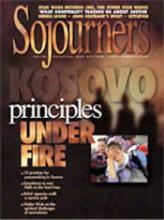Some things are still worth celebrating. Doubt has been cast on the free-love, anti-establishment, mind-expanding drug culture of the 1960s by AIDS, hepatitis C, and the sight of former New Leftists shouting "Yippie!" as the stock market broke 10,000. Yet it’s hard to escape the fact that America’s most tumultuous decade produced
some truly enduring music. Reshaped by the current dominance of rock and roll, 1960s flashbacks open with the relative innocence of Bob Dylan’s "The Times They Are A-Changin’" and close with Jimi Hendrix’s violent evisceration of "The Star-Spangled Banner." But for many people during the era, it was jazz—not rock—that defined the avant-garde, both musically and politically. In the midst of the struggle against American apartheid, jazz, like almost anything else African Americans did, could be and was construed as a political act.
During that era of remarkable change, jazz musician John Coltrane was held up as the flagbearer of the avant-garde by both critics and the movement. Yet the effort to define reality by one’s political agenda may have caused both sides to diminish Coltrane’s deeper significance. The explorations "Trane" undertook through his saxophone indicated that the truly relentless pursuit for freedom required an equal measure of spiritual discipline. If there was any flag borne by this artist, called "the heaviest spirit of them all" by poet Amiri Baraka, it was that transformation came first through the spirit.
Now, as technology propels us into a time of change of perhaps even greater magnitude and significance than that of the 1960s, and we are tempted to believe in the unrestrained idols of smart bombs and the free market, we have a renewed opportunity to learn from the humble, searching trailblazer, John Coltrane.
Read the Full Article
